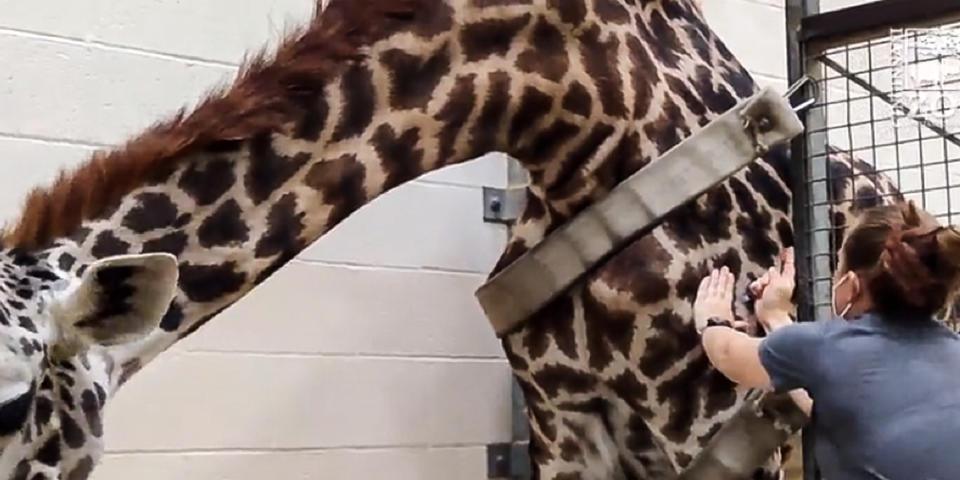Cincinnati Zoo vaccinates 80 animals against COVID-19
The Cincinnati Zoo announced Monday that 80 of its animals have received two doses of a COVID-19 vaccine designed for veterinary use.
In a press release, the zoo said it’s been vaccinating big cats, great apes, red pandas, goats, giraffes, river otters, skunks, bearcats, as well as some domestic dogs and cats.
The zoo said technicians and handlers worked for weeks to get their animals “comfortable with everything that they would see and feel when they got the injections” and that most were administered without anesthesia.
Cincinnati Zoo Director of Animal Health Dr. Mark Campbell said in the release, “We were concerned that the fresh memory of the first injection would make animals less willing to offer a shoulder or thigh for the second round, but they did!”

Campbell added that the success “is 100% due to the strong relationships these animals have with care staff and our animal health team.”
The remaining animals will receive their second dose within the next two weeks, the zoo said.
Since the start of the pandemic, COVID-19 has spread in zoos and farms across the world among certain mammals, like big cats, great apes and minks.
In late 2020, Denmark culled 17 million minks after outbreaks and viral mutations were reported at more than 200 fur farms.
In September, the National Zoo in Washington, D.C., found that nine of its big cats were infected with the coronavirus after they displayed symptoms like coughing, sneezing and lethargy, and said at-risk animals would soon be vaccinated.
That same month, Zoo Atlanta reported an outbreak among a troop of western lowland gorillas.
The experimental veterinary vaccine being used in Cincinnati and at other U.S. zoos is made by Zoetis, one of the largest animal pharmaceutical manufacturers in the United States.
Christina Lood, a spokesperson for Zoetis, said scientists at the company “immediately” began working on a veterinary coronavirus vaccine after Hong Kong reported infections in dogs early in the pandemic.
But Lood said it was the outbreak within Danish mink farms that made the U.S. Department of Agriculture, which regulates veterinary vaccines, take notice.
“The USDA said, ‘Okay, now we want a vaccine for mink potentially, so we kind of pivoted to mink last fall, and the San Diego Zoo was kind of watching all this.”
An outbreak among gorillas in San Diego struck in early 2021, and the zoo requested experimental access to the the Zoetis vaccine. Lood said Zoetis donated their leftover doses from prior safety studies and the San Diego Zoo administered them to nine of the great apes in March.
The vaccine has been universally well tolerated by animals, Zoetis reports, but coronavirus has continued to spread among zoo animals in San Diego and around the world.
In July, the San Diego Zoo reported an unvaccinated snow leopard tested positive for COVID-19 after displaying symptoms.
By summer, after more coronavirus outbreaks struck zoo animals, Zoetis said it had received even more requests for access to its experimental vaccine and manufactured a new batch, with those first doses going to the Oakland Zoo in late June, Lood said.
Isabella Linares, marketing associate with the Oakland Zoo, told NBC News that of the more than 100 animals designated “at-risk” by specialists — including primates, large cats, river otters and bears — just 37 still have yet to be vaccinated
One reason not all animals have been vaccinated is that participation is “voluntary,” Linares said.
“The tigers are trained voluntarily to present their backside to us so we can give them the vaccine,” she explained, saying most are already trained to do so from prior vaccinations. But she says some animals, like one of the zoos leopards, needs more time to learn.
Just one animal at the Oakland Zoo, a brown bear, had post-vaccination side effects — tenderness at the injection site — and that none of their vaccinated or unvaccinated animals have tested positive for coronavirus.
“We are really lucky,” Linares said, noting that an unvaccinated African lion at the Honolulu Zoo recently died after testing positive for the virus.
This story first appeared on NBCNews.com.

